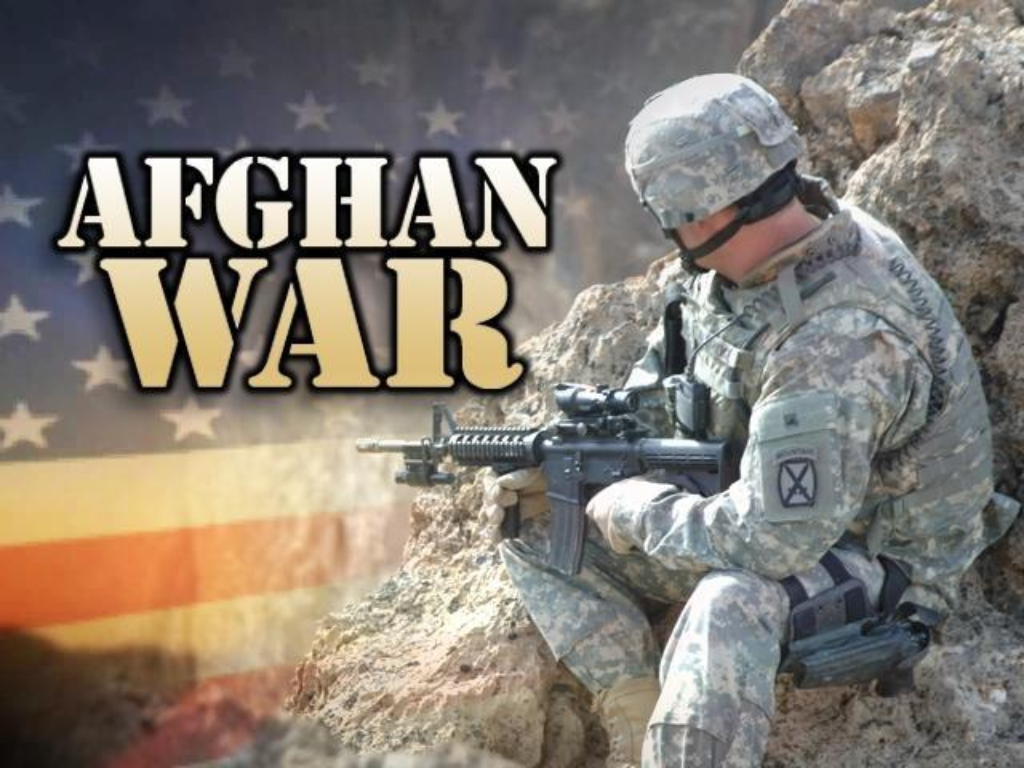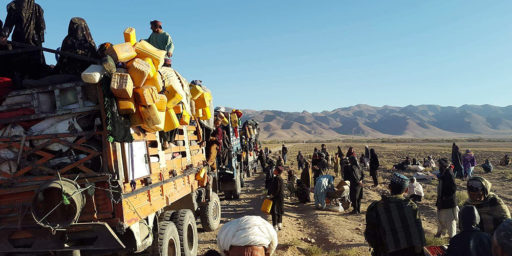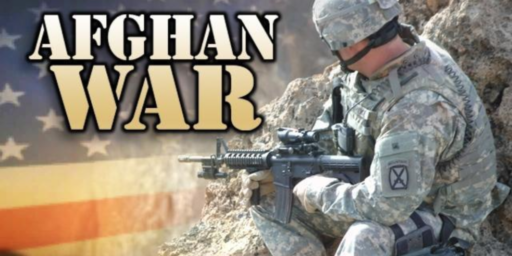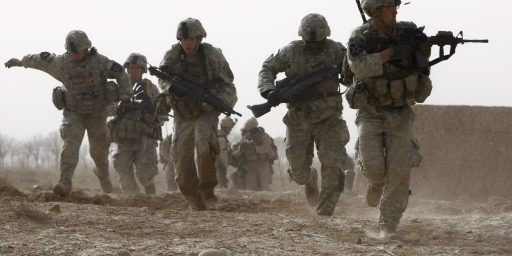US Signs Deal with Taliban
It's not clear what has been achieved.

The United States has had fighting forces in Afghanistan for over eighteen years.* That may be about to end. Then again, we’ve thought that before.
ABC News previewed the deal yesterday afternoon:
After a week-long deal to reduce violence across Afghanistan, the U.S. and the Taliban are set to sign a historic agreement Saturday that would see U.S. troops start to withdraw, according to a statement issued Friday afternoon by President Donald Trump.
“Soon, at my direction, Secretary of State Mike Pompeo will witness the signing of an agreement with representatives of the Taliban, while Secretary of Defense Mark Esper will issue a joint declaration with the government of Afghanistan. If the Taliban and the government of Afghanistan live up to these commitments, we will have a powerful path forward to end the war in Afghanistan and bring our troops home,” Trump said.
WaPo has just reported that the deal is done:
The United States and the Taliban signed a peace deal Saturday that calls for the full withdrawal of American troops from Afghanistan within 14 months — a turning point in an 18-year war that has cost tens of thousands of lives.
The complete withdrawal of U.S. and coalition troops is contingent on a guarantee from the Taliban that Afghan soil will not be used by terrorists with aims to attack the United States or its allies, according to a copy of the agreement released by the State Department as the signing was underway.
But the Taliban does not have full control over all areas outside government hands. Other factions, including breakaway Taliban groups and others claiming allegiance to the Islamic State, have footholds around the country and potentially could grow stronger without U.S.-led forces to keep them in check.
Other major challenges lie ahead: Afghanistan’s deepening political crisis, a controversial prisoner swap and complex intra-Afghan talks that could drag on for months or longer.
Even the relative calm in Afghanistan over the past week — a precondition for the peace deal signing — was thrown into question.
The spokesman for the Taliban’s Qatar office, Suhail Shaheen, told The Washington Post that the Taliban hoped for a “permanent solution” to violence levels. But the pledge for a week-long period of reduced violence has “ended,” he said.[…]
The deal signing came after a seven-day “reduction in violence” in which U.S., Afghan and Taliban forces pledged not to carry out offensive operations. The agreement does not specify whether that commitment would continue. Instead, it notes that a cease-fire would need to be agreed upon in intra-Afghan talks that are expected to start in 10 days.
The withdrawal will begin with a drawdown to 8,600 troops within 135 days, according to the document. During that time, U.S. allies and coalition members will also proportionally draw down their forces.
NYT adds:
The war in Afghanistan in some ways echoes the American experience in Vietnam. In both, a superpower bet heavily on brute strength and the lives of its young, then walked away with seemingly little to show.
American efforts to instill a democratic system in the country, and to improve opportunities for women and minorities, are at risk if the Taliban, which banned girls from schools and women from public life, become dominant again. Corruption is still rampant, the country’s institutions are feeble, and the economy is heavily dependent on American and other international aid.
The signing of the agreement in Doha, Qatar, which followed more than a year of stop-and-start negotiations and conspicuously excluded the American-backed Afghanistan government, is not a final peace deal and could still unravel.
But it is seen as a step toward negotiating a more sweeping agreement that some hope could eventually end the insurgency of the Taliban, the militant movement that once ruled Afghanistan under a severe Islamic code.
The war cost $2 trillion and took the lives of more than 3,500 American and coalition troops and tens of thousands of Afghans since the U.S. invasion in aftermath of the Sept. 11 attacks, which were plotted by Al Qaeda leaders under the protection of the Taliban.
The withdrawal of American troops — about 12,000 are still in Afghanistan — is dependent on the Taliban’s fulfillment of major commitments that have been obstacles for years, including its severance of ties with international terrorist groups such as Al Qaeda.
Spencer Ackerman is bleaker still. His headline says it all: “The Taliban Peace Deal Might Have Been Had Many Years and Thousands of Lives Ago.”
No one will ever know what would have happened if Rumsfeld and the George W. Bush administration had permitted Karzai and Omar to work out a deal—whether it would have held, whether the Taliban would have truly broken with al Qaeda, whether Afghanistan would have known peace. But there is brutal certainty about what happened instead: 2,298 dead U.S. servicemembers and at least 43,000 dead Afghans in a war the U.S. fought for a generation rather than admit it could not win.
Ackerman hands out unexpected praise:
Whatever emerges, Trump—to his credit and to the shame of those Trump critics who consider themselves more responsible stewards of U.S. foreign policy—has shattered the generation-long American political cowardice that inhibited negotiating an end to the war.
At least three times over the past 19 years that the U.S. could have had such a deal, on terms at least as favorable to Washington as the one reached now, and likely better.
The first was the 2001 surrender offer. Another opportunity arose in 2003. The third came amid Obama’s 2010-11 troop surge.
In the early days, the U.S. and its Afghan clients were so triumphant about their apparent victory, and the wounds of 9/11 and the Afghan civil war so fresh, that they sneered at negotiations. Later, when the Taliban insurgency showed the folly of that decision, the U.S. preferred to fight on in the similarly elusive hope that more violence would mean more leverage. Instead, over the course of 19 years, the Taliban simply strengthened their own.
“The outcomes we could have gotten a decade earlier, two decades earlier, would have been far stronger,” lamented retired Army Col. Chris Kolenda, who was part of the failed 2011-12 peace effort and has ever since urged the U.S. to negotiate with the Taliban. “It’s a missed opportunity,” assessed Ali Jalali, the former Afghan interior minister whom the Taliban contacted in 2003 to explore a deal.
Ackerman may well be right. But we’ll never know.
The thing about wars and the killing and destruction they sow is that they make accepting outcomes that would otherwise have been unacceptable possible. Yes, it was American hubris to think we could fully defeat an indigenous force in a war they were prepared to fight forever and we were not. It’s not the first time we’ve made that mistake. But the Taliban, too, were unlikely to go from governing Afghanistan to a bit player. It’s more thinkable after nearly two decades of fighting.
Still, it’s not obvious that we achieved much of consequence for our investment of blood and treasure. Going after al Qaeda in Afghanistan and punishing the Taliban government that sheltered them were politically necessary decisions in the wake of the 9/11 attacks. And endless and failed nation-building effort was not.
_____________________
*So long that the Army has changed its camouflage pattern multiple times during the fight. The Army Combat Uniform pictured in the graphic atop the post was the second of these. It has long since been retired.





Let’s GTFO of this mire of quag.
Did they make it 14 mos so they can say next year that President Warren lost Afghanistan?
My immediate response is that the only thing that we appeared guaranteed to achieve is a partial drawdown of troops.
In 135 days this will take us from 13,000 to 8,600. 8,6o0 is still far from zero.
This bring me to a joke that only James will get (and he may not remember the reference), but all of this raises the question of “What do ‘full withdrawal’ mean?.”
remember the “surgical strikes” with smart (laser guided) bombs in the 80s, which killed some bystanders (“collateral damage”)? At the time it was evident that bombs, even “smart” ones, were too blunt an instrument for even figurative surgery.
I’m thinking war has revealed itself evidently as too blunt an instrument for nation-building, assuming that nation-building is even possible or desirable.
There’s no question that the 9/11 attacks warranted a strong, violent response. But perhaps regime change, even of such odious type as the Taliban’s, was perhaps not the best solution to the terrorism problem.
I’m not trying to blame Bush the younger. Come, he had plenty of support for that war, all over the world. We were all in on it, and we all blew it. Iraq is the disaster he owns, but that’s a different matter.
@Steven L. Taylor: My understanding is that the rest are removed in 14 months. See:
https://www.theamericanconservative.com/state-of-the-union/breaking-afghan-deal-brings-all-troops-home-in-14-months/
Though I now see the final removal is based on the Taliban holding up certain commitments:
https://www.theamericanconservative.com/larison/a-chance-to-end-americas-longest-war/
Two thoughts – first that Trump deserves credit for these steps to hopefully bring this to a close – full stop.
Second, the 14 month commitment mixed with the election makes this feel eerily like the Iran agreement. It seems entirely possibly that we could have a new President come in, with a different interpretation of this agreement, sand decide to scuttle the deal. It will be interesting to see how many people who felt that the Iran deal should have been a ratified treaty will say the same thing about this one.
@mattbernius: But since there are contingencies in place for the withdrawal, I will believe it when I see it (and I would feel that way if my most favorist of presidents was in office).
Well, it may be more dignified than Hueys picking up the last desperate few on the embassy roof. So there’s that.
I am for getting out. We lost the campaign when we did not nab the leadership of AlQeida and lots of their troops at Tora Bora. We had been told by Mr. Rumsfeld that there was a huge complex of sophisticated caves covering lots of enemies. When we got there, there were some natural caves without much in the way of enemy infrastructure. It revealed that our actions in Afghanistan amounted to chasing an illusion. The whole campaign there was pointless. We were not going to bomb Afghanistan into turning into Switzerland.
“So healthy people if you’re healthy you’ll be fine.” Witch Doctor Trump
He hasn’t mentioned the first US death from coronavirus. Every thing is rosy!
Afghanistan is my war, it consumed about six years of my life and I’m one of the very fortunate ones. I’ve spent way too much time mourning dead and injured friends and colleagues in what we’ve known for at least 12 years was a pointless and unwinnable conflict.
This step has taken far too long, but I’m glad it’s finally here and hope it will succeed in getting us out of there. Trump deserves credit for taking the political risk his predecessors didn’t. Let’s hope he doesn’t fvck it up with some stupid tweets.
@Andy: If we are actually out in the timeline provided, I will be happy to acknowledge that he did the right thing. I am just way too skeptical given the way these things tend to work.
@Steven L. Taylor:
This agreement is more than what anyone has done so far. Obviously many things could change and timelines are never certain, but this is a good and necessary first step.
@Slugger:
We might be able to bomb Switzerland into becoming Afghanistan though…
Or just spend 18 years bombing Afghanistan to make it marginally more Afghanistany.
@Michael Reynolds:
It’s way more dignified because the FOX Newsies aren’t running around screaming “Cut and run!!”. Only a Nixon could go to China, at the moment only a Republican can back out of… any war, really.
This is declaring victory and coming home, regardless of the reality on the ground.
Typically Presidents are loath to do this, due to the blow back they’ll receive from the party out of power. But Tiny is in a Goldilocks situation, he has cowered any and all potential Republican critics and any Dems who might criticize the move are vanishingly few. America is tired of wars and really doesn’t care what happens next in the countries where we have been fighting.
A few will weakly bemoan the fact we are abandoning some allies to likely death and will express remorse that our withdrawal will condemn Afghan women and girls to chattel status, but…
The Taliban have been wandering in the wilderness for nearly 20 years and that experience will have changed them as well.
@Sleeping Dog:
I’d guess the overwhelming number of 2001-era Taliban have been killed in the fighting. What we didn’t quite grasp was how easily they’d be replaced—mostly simply because we were there fighting. (David Kilkullen’s Accidental Guerrilla is the best exposition of that thesis.)
Kevin Drum has a commentary which is largely where I come out:
“This sure seems like a great deal for the Taliban. All they have to do is act like good boys for the next 14 months. Then, when all the US and other foreign troops are gone and it’s obvious they aren’t coming back, they can break off negotiations on some pretext and go back to destroying the Afghan government. Easy peasy.
I’m all in favor of this. It provides a (bare) fig leaf of credibility for the United States, and ends up where things were always bound to end up from the start. Eventually we were always going to leave, and when we did the Taliban would once again have a free hand. If the past is any guide, that means they’ll control the country before long.”
@Sleeping Dog:
Or perhaps it’s actually acknowledging the reality on the ground — that this was never going to change and we weren’t prepared to take any steps beyond this to change the reality.
It’s also helpful that no one has ever really articulated what “victory” looks like in any measurable sense.
@Mister Bluster:
Wait, what? Does he realize that with a smile he is also saying: “…. But if you are not healthy, you’re fu@&ed.” ???
@Sleeping Dog:
Maybe changed them maybe not. I don’t think they were ever down with the whole world-domination thing. Religions zealots tend to be of two types, those who seek to expand their dogma to others and those who seek to fence out the rest of the world. IMO the Taliban was (is?) of the latter type.
https://www.newsweek.com/talibans-oral-history-afghanistan-war-79553
It seems entirely plausible that for some time to come they will seek to toss the former who come to Afghanistan out after the price they paid for hosting Bin Laden.
No way I support a policy that would allow the Taliban to come back and strike fear on millions. Gay hangings, unschooled girls, acid throwing- count me out.
I was listening to the BBC in my car while running errands. Apparently, a visit to the White House by Taliban leaders is part of the deal. I look forward to the photos of Taliban guys and our Prez sharing hamburgers in the Oval Office.
On second thought, how many lives and dollars have been spent? Maybe a joint visit to Arlington and no food would be better.
@James Joyner:
Something that never ceases to amaze me is how Americans, including our leaders, either dismiss or never acknowledge that citizens of other nations have national pride. They’re patriots, but we don’t see that.
That brings up an interesting point…in the current political environment, only a Republican could present a plan like this…if a Democrat did, he or she would be portrayed as a weak pussy running away from our obligations and empowering our enemies…I guess if a Republican had come up with an Iran plan (like the one Obama pushed) everything would be hunky-dory…
@Sleeping Dog: Back when all this started someone said fighting to eliminate the Taliban in Afghanistan was like going into Georgia to defeat the red necks. That “Taliban” is not so much an organization or a cause, as their life style.
@Raoul: As long as you and those of like mind are willing to send your sons, grandsons, great grandsons, and so on exclusively and are willing to pay for the war with your taxes rather than on credit, I will support whatever policy you wish to pursue. But this thing of sending other people’s children to fight wars paid for by sending the bill to those people’s grandchildren must stop. Period.
The worst withdrawal since Eric.
(Stephen Colbert, in another context)